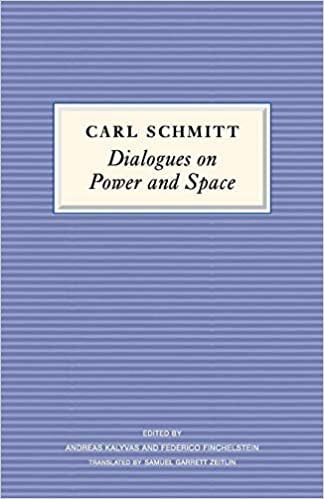1/ @BrunoLatourAIME's engagement with Carl Schmitt in recent years is v. important. He has engaged in reading groups & seminars with @msnorthcott & others. In this recent article, dedicated to @adam_tooze , he picks up Schmitt’s wonderful, late-career "Dialogue on Power & Space".
2/ Here is the link to the article: http://www.bruno-latour.fr/sites/default/files/164-SCHMITT-CRITICAL-INQUIRY.pdf
3/ Latour always emphasises the the dosage of Schmitt must be applied carefully, as one would a poison, but claims it is “worth having a second look at those thinkers from the Right who have given to the land and to land grabs the pride of place in their cosmology” (p.1).
4/ Land, space & terrestriality have been vital to Latour's political theological thought since c.2005. & it is no exaggeration to say that the concept of Gaia is the key to understand everything Latour writes at the moment. Schmitt is the lens through which we can grasp this.
5/ Schmitt provides Latour with at least four things. First, Schmitt confirms that space is not an empty container, a framework in which actors move in a kind of subsidiary or secondary way. This is also the insight of Michel Serres in "Five Senses" & many other texts.
6/ Second, Schmitt helps us understand space as “lived”. Space is only space b/c it is populated & defined by actors. “Neutral space is replaced by what is generated in the course of the movement of life forms” (p.9). To deny this is to open the door to a dangerous metaphysics.
7/ Third & this is key: Schmitt shows us how space can be a site of constructive politics. “Spatialization is always the result of what could be called a vector” (p.8). If space is not pre-determined by a metaphysics, we must ask: your space or my space? Or can we live together?
8/ Fourth, then, this is the sort of politics we need to navigate the Anthropocene: “because Schmitt’s position on space is so extreme and so polemical, it helps to point out what has been missing all along in the notion of space associated with most ecological thought" (p.10).
9/ Latour reminds us that the Schmitt-character in the Dialogue reprimands those who seek to abandon terrestriality in favour of occupying a "neutral space", represented by the age of maritime conquest (colonial England) or the space age (modern America). These are non-political.
10/ True humanity, for Schmitt (the Nazi!!), means resisting this notion of "progress" & learning again how to be political, that is, how to occupy a finite, limited Earth alongside one's neighbours. This is the love of "le prochain" that Latour elsewhere claims comes from REL.
11/ I think Latour has misread Schmitt's political theology here (for me, theology is the engine of Schmitt's understanding of space, whereas Latour seems to think it is an "in spite of", see fn.13 of the article; Latour fails to see the link with his own REL here).
12/ But this article is nevertheless a great insight into Latour's recent thought on politics (political theology) & frames the ENTIRE argument of the wonderful catalogue book "Critical Zones". https://mitpress.mit.edu/books/critical-zones

 Read on Twitter
Read on Twitter




